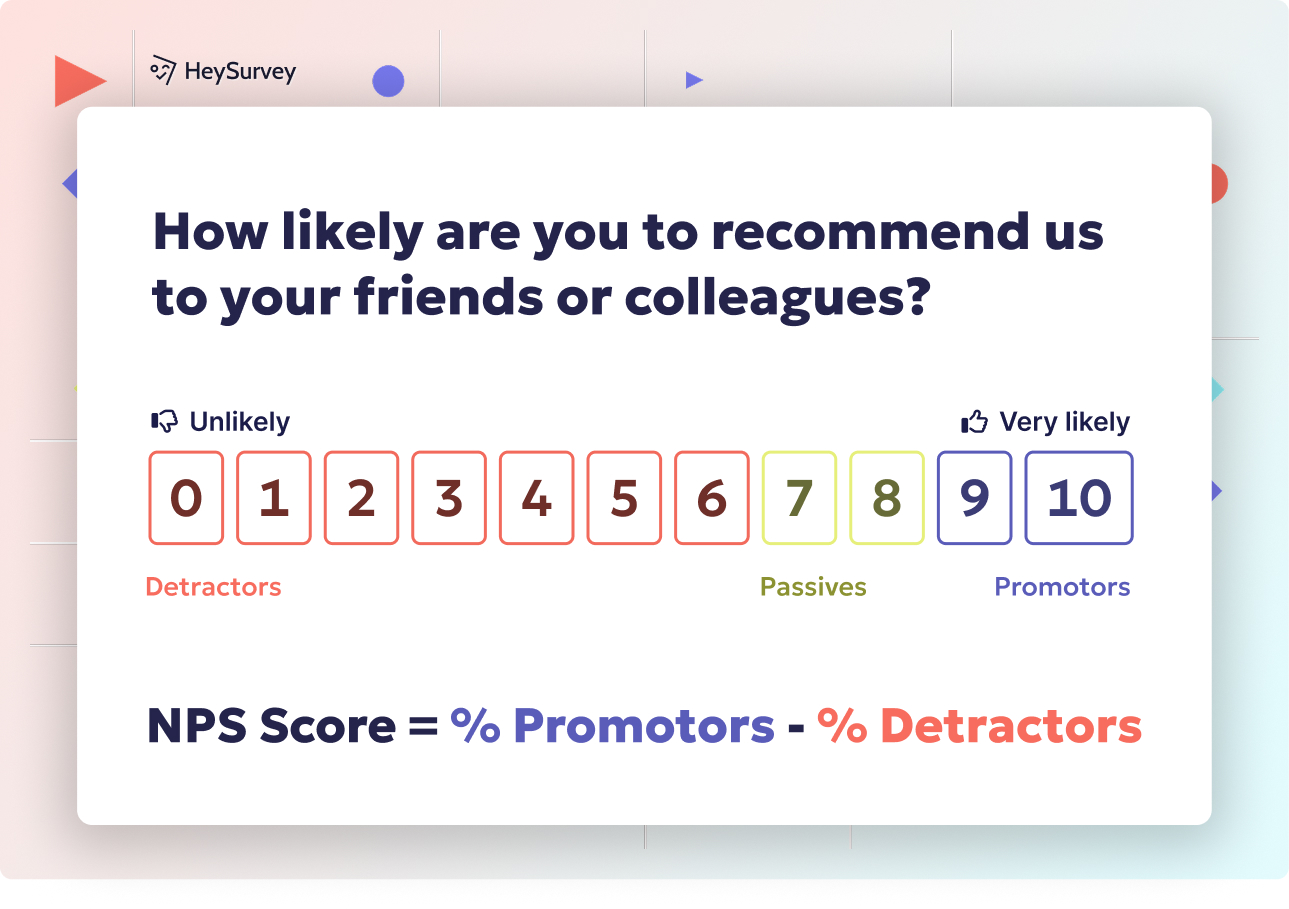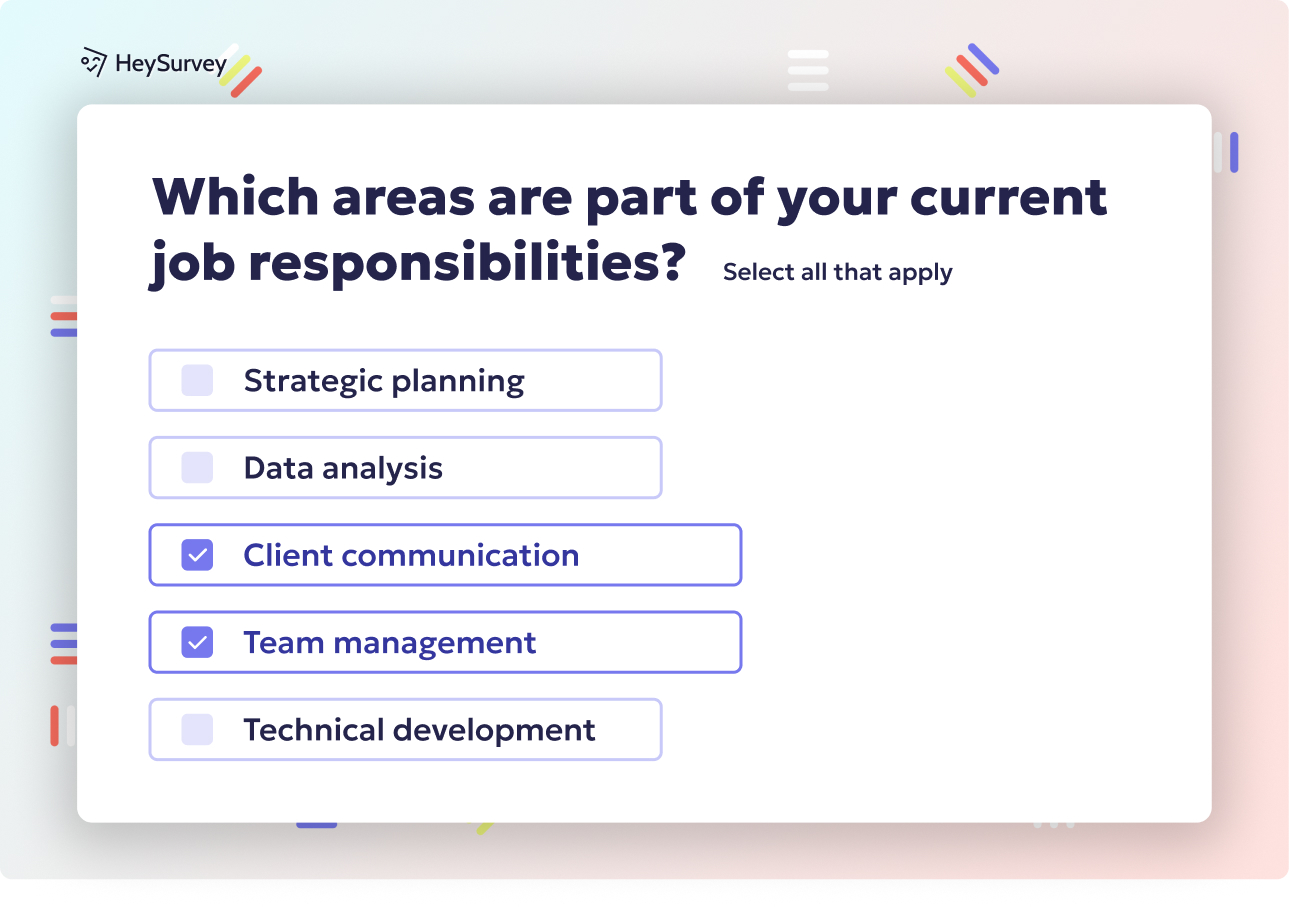25 Body Image Survey Questions for Boosting Self-Esteem
Explore body image survey questions with 25 sample prompts to gain vital insights into self-perception, satisfaction, and mental well-being.
Body image survey questions are a window into how people see themselves. They show how appearance influences self-esteem, social interactions, and emotional resilience. They also guide wellness advocates to address areas affecting confidence and mental health.
These questions can be light and playful. They allow individuals to reflect on their beauty standards, personal goals, and occasional insecurities. Body image surveys encourage both honest insights and gentle humor, making the process feel supportive instead of critical.
Self-Perception Surveys
Why and When to Use
People often wonder about the reality of their self-image, which can be swayed by culture, peers, and personal ideals. Self-Perception Surveys address how much of this perception is grounded in fact and how much is influenced by emotions and environment. They’re used at early stages of self-esteem programs or to spot slight anxieties before they grow.
You might include them in school mental health initiatives, where students explore self-identity. They also fit perfectly into life coaching sessions that aim to redirect negative self-talk. Elevated self-awareness can encourage healthier behaviors and a more positive outlook.
5 Sample Questions
- How satisfied are you with your overall physical appearance?
- How often do you compare your looks to others?
- Do you believe your body shape accurately reflects your identity?
- How confident do you feel about your appearance in social situations?
- Do you ever feel that your body image impacts your daily activities?

Body Satisfaction Surveys
Why and When to Use
Body Satisfaction Surveys narrow down specific body parts or features, discovering what people love and what challenges their comfort. They’re especially useful for companies running wellness campaigns aimed at boosting confidence. Results from these surveys also highlight how individuals feel about strategic fitness programs or nutritional guidance.
Anytime a post-workout survey is needed, these questions come in handy to measure progress in both mind and body. They expose hidden frustrations, such as persistent insecurities or pride in particular attributes. Deeper self-awareness often follows, guiding participants toward balanced health goals.
5 Sample Questions
- Are you satisfied with your body weight?
- How do you rate your level of comfort with your body shape?
- Do you feel at ease wearing fitted or revealing clothes in public?
- How often do you feel ashamed of your physical appearance?
- Do you believe you can maintain a healthy lifestyle without altering your physique?
Create your survey, it's 100% free
Create a New Survey
Ready to begin? Simply open one of our templates with the button below to get started. If you want a fresh slate, pick the empty option and name your survey. You’ll see the Survey Editor pop up, brimming with possibilities.Add Your Questions
Spice up your survey by including a variety of question formats. Add statements, choice questions, or scale questions to capture every layer of feedback. Mark essential questions as required, and consider adding images for personality.Publish Your Survey
Once you’re satisfied, hit that Publish button to make your survey live. You’ll have a shareable link to pass around and gather responses in real time.
• Bonus Steps: Upload a logo to highlight your brand, change color schemes in the Designer Sidebar, and set branching or custom endings for a personalized flow. Or you can always skip right ahead to the final survey if you’re eager to see results!
Body Dysmorphia Screening
Why and When to Use
Individuals sometimes have an intense focus on perceived flaws that others might not notice. Body Dysmorphia Screening is a more specialized angle, assisting professionals in uncovering deeper or clinical body image disruptions. If someone struggles with persistent thoughts about being “imperfect” or “abnormal,” these surveys signal potential support needs.
A 2020 study indicated that approximately 2% of the general population experience body dysmorphic disorder, correlating with higher rates of depression and anxiety Source.
They help therapists determine if a person fits the criteria for more comprehensive mental health interventions. Timely assessment can lead to better coping strategies and a renewed sense of self-acceptance.
5 Sample Questions
- Do you spend a lot of time worrying about flaws in your appearance that others may not notice?
- How often do you check mirrors or avoid them altogether?
- Have concerns about your physical traits caused significant distress in your life?
- Do you avoid social events due to perceived imperfections in your appearance?
- Have you considered cosmetic procedures to address appearance issues perceived only by you?
Weight & Shape Concerns Surveys
Why and When to Use
Weight & Shape Concerns Surveys highlight whether individuals frequently focus on their scale number or the silhouette in the mirror. They’re key for health and nutrition professionals wanting to gauge shifts in perception over time. Results show whether a client’s focus is edging into unhealthy territory or if their approach is balanced.
Sometimes these surveys can kick-start support groups where individuals share stories of embracing or struggling with weight fluctuations. They can also expose patterns of disordered eating, prompting valuable guidance to foster healthier outlooks. Breaking negative cycles is crucial in preventing severe emotional turmoil.
5 Sample Questions
- Do you frequently focus on losing or gaining weight?
- Are you overly concerned with specific body areas (e.g., stomach, thighs)?
- How much does your weight influence your sense of self-worth?
- Do you restrict certain foods to maintain or change your body shape?
- Have concerns about body shape impacted your personal relationships?

Media Influence & Social Comparison Surveys
Why and When to Use
Media Influence & Social Comparison Surveys turn attention toward the flooding of images from TV, internet, and social apps. They examine whether people feel pressured by posts, ads, or celebrity interviews. This is vital in understanding how deeply curated media affects self-perception and daily habits.
Recent findings suggest that over 70% of social media users admit they compare themselves to influencers’ edited images Source.
Schools might use these surveys to educate students on media literacy, helping them differentiate reality from highlights and filters. Recognizing edited content encourages healthier expectations and a kinder attitude toward one’s own body.
5 Sample Questions
- How often do you compare your appearance to images on social media?
- Do celebrity or influencer posts impact how you view your body?
- Have you felt pressured to change your appearance due to media exposure?
- Do you feel anxious after seeing heavily edited photos of others?
- How frequently do you believe social media sets unrealistic body standards?
Impact on Mental Health & Well-Being Surveys
Why and When to Use
Body image plays a huge role in emotional wellness, sometimes fueling anxiety or depression. Impact on Mental Health & Well-Being Surveys tackle this link head-on. Therapists or employers often include these questionnaires to tailor mental health support strategies.
They reveal if body dissatisfaction triggers mood swings or conflicts in everyday life. Early intervention can prevent spirals into harmful coping mechanisms, ensuring a healthier state of mind. Individuals who see these connections feel empowered to address them more directly.
5 Sample Questions
- How do concerns about your body affect your overall mood?
- Do you experience anxiety related to being judged for your appearance?
- How often does feeling unhappy with your body lead to stress?
- Do you resort to unhealthy coping mechanisms when dissatisfied with your appearance?
- Have you noticed a link between body image and your self-esteem?

Body Image in Adolescents & Teenagers
Why and When to Use
Adolescents go through waves of changes and social pressures, which makes Body Image in Adolescents & Teenagers a distinct category. These surveys offer insight into whether young people face bullying, social media overload, or unrealistic comparisons to peers and celebrities.
A national report on schooling environments found that 1 in 5 teenagers struggle with body image distress influenced by peer comparisons Source.
They’re valuable for teachers, counselors, and parents seeking early intervention programs and open discussions. Empowering teenagers with self-awareness at this age can set them up for a healthier future, both in mind and body.
5 Sample Questions
- How comfortable are you with your physical changes during puberty?
- Do peers influence your perception of an ideal body shape?
- Have you ever been bullied because of your appearance?
- How often do you compare yourself to friends’ bodies?
- Do you feel pressured to look a certain way at school or on social media?
Body Appreciation & Positive Body Image Surveys
Why and When to Use
Focusing on what we like about ourselves can bring lightness and joy to daily life. Body Appreciation & Positive Body Image Surveys revolve around asking what people love about their bodies instead of what they want to change. They’re fantastic for teams forming self-love or wellness seminars, as well as personal development courses.
By targeting areas of appreciation, participants discover more reasons to celebrate. This approach also helps shift the dialogue from critical to affirming. Uplifting perspectives can create a foundation for true mental and emotional wellness.
5 Sample Questions
- Do you recognize and appreciate the functions your body performs?
- How often do you practice positive affirmations about your body?
- Do you find value in your body’s uniqueness over conventional standards?
- How likely are you to engage in self-care activities based on self-respect?
- Do you accept compliments about your appearance graciously?
Do’s and Don’ts for Body Image Survey Questions
Do’s
Do’s and Don’ts for Body Image Survey Questions keep the environment respectful and the questions focused. Open, inclusive language fosters an atmosphere where people feel safe enough to share genuine responses. This leads to more accurate data and can improve follow-up actions.
- Use inclusive language and gender-neutral terms.
- Provide clear definitions or context for sensitive topics.
- Ensure anonymity to encourage honest answers.
- Pilot test questions to refine wording and remove ambiguity.
- Offer resources or follow-up support if sensitive topics arise.
Don’ts
Failing to consider cultural backgrounds or personal experiences can lead to ambiguous or hurtful questions. Kindness and empathy should underline any body image survey, ensuring it gathers helpful data rather than fueling insecurities.
- Avoid leading questions that imply judgment.
- Don’t neglect cultural differences when framing questions.
- Steer clear of negative or shaming language.
- Never make assumptions about respondents’ experiences.
- Do not ignore the potential mental health impact of survey content.
In closing, body image surveys open the door to understanding, dialogue, and empathy. They guide us to appreciate each person’s relationship with their body and to intervene when challenges arise. They remind us to keep our words and mindset kind. They also highlight where we can move toward positive change. Finally, they encourage everyone to find a happier, more confident outlook.